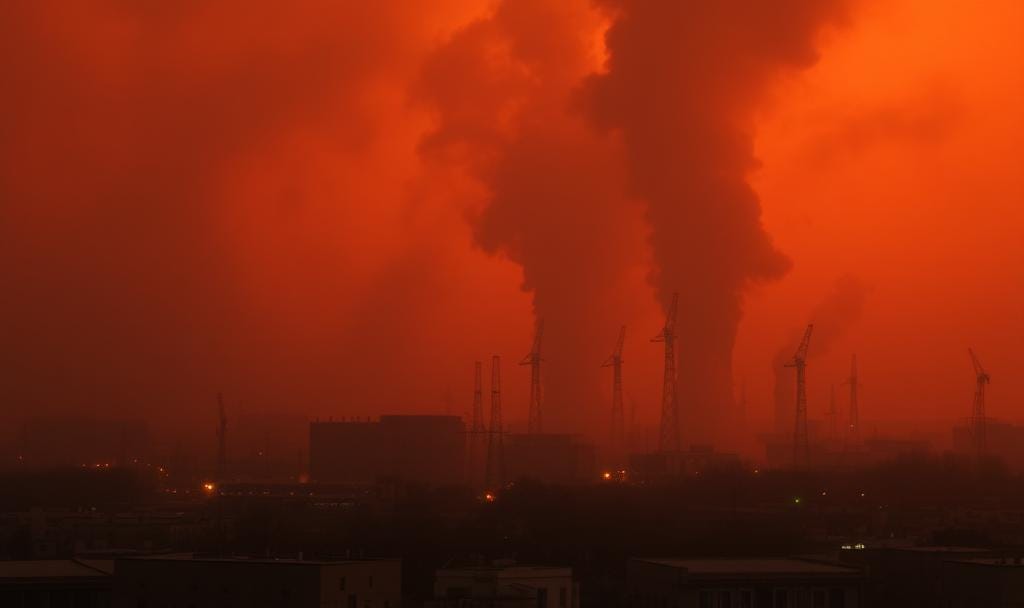10 Things Global News - 11th September 2025
The news from around the world
NATO Faces Scrutiny Over Drone Defence Gaps
Charlie Kirk Killed In Utah Campus Shooting
Doha Strike Derails Gaza Mediation
Israel Signals It Could Strike Doha Again
EU Chief Seeks Sanctions And Trade Curb On Israel
Legal Status Dispute Follows Hyundai Raid
Army Patrols Continue in Kathmandu Amid Deadly Unrest
Carbon Majors Linked To Worsening Heatwaves
Legal Scrutiny Mounts Over U.S. Caribbean Boat Strike
Ex-FBI Leaders Sue, Alleging Political Purges
This week’s drone incursions into Polish airspace have shifted attention from the incident itself to NATO’s preparedness for modern aerial threats. While Polish and allied aircraft intercepted several drones, analysts stressed that the alliance’s reliance on costly F-35s, F-16s and Patriot systems against cheap, mass-produced UAVs is unsustainable.
Former NATO officials argued that the ability of foreign drones to enter alliance territory shows a failure of deterrence. Experts warned that NATO’s Cold War-era defence posture leaves it vulnerable if confronted with the kind of large-scale swarms Ukraine experiences almost nightly. Proposals range from greater coordination through multinational air defence exercises to revising rules of engagement and even permitting pre-emptive strikes on hostile drones before they reach allied airspace.
For now, NATO leaders present the response as a success, but the deeper concern remains whether the alliance can adapt fast enough to counter low-cost, high-volume threats.
Sources: Reuters, Politico Europe
Conservative activist Charlie Kirk was shot dead while speaking at Utah Valley University, prompting a manhunt for a suspect believed to have fired from a rooftop sniper position. The attack took place before 3,000 people at an outdoor event, with witnesses describing scenes of panic as students fled. Officials confirmed Kirk, 31, was hit in the neck by a single shot at midday, and despite detaining two men for questioning, both were released without charges. The shooter remains at large.
President Donald Trump called the killing a “dark moment for America” and ordered flags flown at half-staff. Utah’s Governor Spencer Cox described it as a political assassination.
The attack shocked audiences nationwide, drawing condemnation across party lines and statements from world leaders. Kirk, founder of Turning Point USA and a prominent Trump ally, had been addressing a question about gun violence moments before he was killed. His wife and children were present at the event.
Sources: BBC, Reuters
Israel ordered Gaza City’s residents to flee south as it intensified strikes, while a surprise airstrike in Doha targeted Hamas negotiators. An Israeli official said Khalil al-Hayya was the target; Hamas said he survived, while his son, his office director, three bodyguards and a Qatari Internal Security Forces officer were killed.
Qatar’s prime minister said Benjamin Netanyahu “killed any hope” for remaining hostages and called the attack “state terror”.
The White House said the “unilateral bombing” in Qatar did not advance U.S. or Israeli goals. Netanyahu accused Qatar of harbouring terrorists and said nations must expel or bring them to justice, warning Israel could act again.
In Gaza City, high-rises were toppled after short warnings, displacing at least 4,100 people, and aid groups said the evacuation order was impossible and illegal.
Sources: Washington Post, The Guardian
Israel’s ambassador to the United States, Yechiel Leiter, said that if Hamas leaders survived Tuesday’s Doha strike, Israel would target them again, as diplomatic fallout widened. The attack, which aimed at Hamas political leaders meeting in Qatar, drew broad condemnation and raised concerns it could derail Gaza ceasefire efforts. The Wall Street Journal reported President Donald Trump had a heated call with Benjamin Netanyahu about the decision.
Qatar’s prime minister said a response was being discussed with regional partners and that Doha was reassessing its mediation role; the U.N. Security Council delayed a meeting so he could attend.
Regional leaders moved to show support for Qatar. Meanwhile Israel carried out a further attack against Sana’a, Yemen, with initial reports saying several people were killed and dozens injured.
Sources: Al Jazeera, Reuters
European Commission President Ursula von der Leyen announced plans to seek sanctions on extremist Israeli ministers and West Bank settlers, suspend bilateral support to Israel, and partially suspend the EU-Israel Association Agreement targeting trade-related matters.
She told the European Parliament that “man-made famine can never be a weapon of war,” as the Commission also moves to freeze support it controls directly. The EU, Israel’s largest trading partner, remains split over Gaza, and it is unclear whether a majority will back the measures.
Sanctions and suspension of the trade agreement would require approval of all 27 member states, though the Commission can halt its own funding without unanimity. Von der Leyen also pledged to further raise EU support for Ukraine. Israeli Foreign Minister Gideon Saar criticised her remarks, saying they strengthen Hamas.
Sources: The Independent, Al Jazeera
Last week nearly 500 people were detained in a raid at Hyundai’s battery plant site in Georgia, including about 300 South Korean nationals, but questions have emerged over whether some were working legally. Immigration lawyer Charles Kuck said many of his clients had valid B-1 or ESTA entries with attached letters authorising work such as installing and calibrating battery equipment. He also represented workers with DACA permits and asylum authorisations.
A leaked Immigration and Customs Enforcement document, obtained separately, showed at least one detainee held a valid B1/B2 visa and had not violated its terms. The file said he was nonetheless required to accept voluntary departure. Kuck described this as unlawful detention.
The Department of Homeland Security, however, maintained the worker admitted to unauthorised employment. South Korea is seeking to repatriate hundreds of its nationals, while construction at the $12.6bn plant has been halted during the dispute.
Sources: Reuters, The Guardian
Nepal’s army deployed across Kathmandu after anti-corruption protests spiralled into arson and violence. Government buildings, including parliament, were torched, politicians’ homes vandalised, and curfews imposed nationwide. The prime minister resigned amid the turmoil. Authorities reported 30 deaths and more than 1,000 injuries over two days, with 27 arrests and 31 firearms recovered. Kathmandu’s airport reopened on Wednesday as residents largely observed the curfew.
Gen Z groups leading the protests said the movement was “hijacked” by opportunists and called off further demonstrations, urging compliance with curfews. The military invited protest leaders to talks as students consolidated new demands.
The unrest followed a short-lived ban on 26 social media platforms that was lifted on Monday, after which anger intensified. Protesters and the army both blamed “infiltrators” for looting and arson.
Sources: BBC, The Conversation
A Nature study analysing 213 heatwaves from 2000–2023 finds every event was made more likely and intense by human-driven warming, with about one quarter that would have been virtually impossible without it. The authors attribute roughly half of the rise in heatwave intensity since pre-industrial times to emissions from the 180 largest fossil-fuel and cement producers, and link a group of 14 “carbon majors” to more than 50 heatwaves that would otherwise have been almost impossible.
The study reports sharp increases in likelihood over time: heatwaves became around 20 times more likely in 2000–2009 than in 1850–1900, and about 200 times more likely in 2010–2019. The findings arrive amid growing climate litigation, with researchers saying attribution science can help connect specific emitters to extreme events.
Sources: Bloomberg, The Independent
A U.S. military strike that destroyed a Venezuelan boat in international waters is facing intensifying legal and political pressure. Officials said the vessel had altered course and appeared to turn before the attack began; President Donald Trump authorised the strike and said 11 people were killed and linked to a Venezuelan gang.
The White House argues the laws of armed conflict allow such force to counter drug threats, but retired senior military lawyers and legal specialists dispute that rationale, noting self-defence claims are further weakened if the boat was retreating.
Democrats pressed the administration to provide evidence that those killed were drug smugglers and to explain the legal authority used, with Senator Tim Kaine signalling a potential War Powers resolution. Senator Jack Reed said there is no public evidence the strike was self-defence and questioned why the boat was not interdicted. The Pentagon says the president acted lawfully and that the message to traffickers is clear.
Sources: Washington Post, New York Times
Three former senior FBI officials filed a lawsuit alleging they were unlawfully fired for political reasons. Brian Driscoll says a Trump administration vetting call posed loyalty questions such as “Who did you vote for?”
The suit names FBI Director Kash Patel and Attorney General Pam Bondi, alleging Patel said the White House and Justice Department mandated removals and that his job depended on firing staff who worked on cases involving the president. The complaint says Patel acknowledged the firings likely violated FBI rules.
Co-plaintiffs Steven Jensen and Spencer Evans describe similar pressures. The suit alleges Deputy Director Dan Bongino urged the firing of a specific agent and fixated on politically sensitive cases, and recounts a “burn bags” episode at FBI headquarters. Evans’s termination letter cited his handling of COVID-19 protocols. The plaintiffs seek to void the firings, clear their names and be reinstated.
















